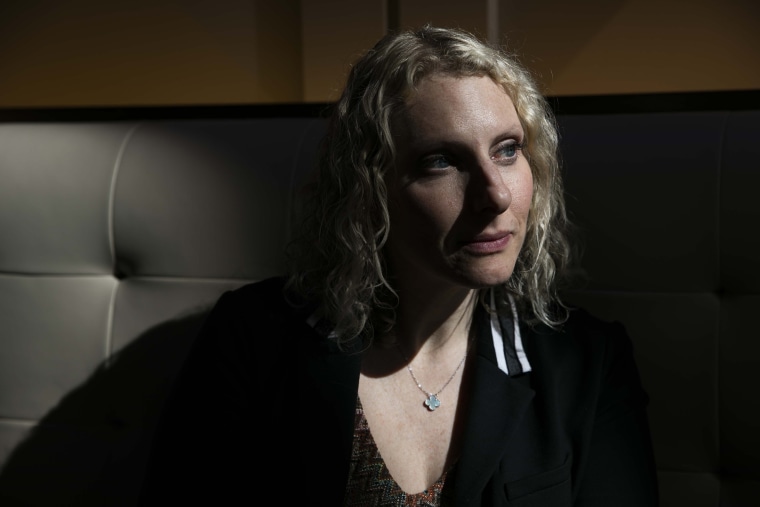The surgeon faced a dilemma: continue an operation that could kill an extremely sick patient on the operating table or sew the patient up, extending their life by only a few painful days at most.
Dr. Deborah Keller, a second-year attending colorectal surgeon at the time at NewYork-Presbyterian/Columbia University Irving Medical Center, wanted assurance she was making the right decision.
She asked a nurse to call her boss, Dr. Pokala Ravi Kiran, the division chief of colorectal surgery, for a second opinion.
“The patient is going to die. Close. What’s the issue?” Kiran barked at her, humiliating her in front of the other medical staff members in the operating room, Keller says.
The brusque remark during the 2019 operation was not out of the ordinary for Kiran, Keller says. She claims he would also comment on her appearance and make her do administrative duties that male colleagues were excused from and that he hired her at a lower starting salary than her male teammates.
Yet her institution did nothing to address the imbalances, her attorneys allege in a complaint filed on Dec. 21, 2021, in Manhattan federal court in which they accuse the prestigious New York City-based medical center of tolerating a “toxic culture of gender discrimination.”
Attorneys representing NewYork-Presbyterian Hospital did not respond to repeated phone calls and emails about Keller’s case. An attorney for Columbia University and Kiran directed NBC News to Robert Hornsby, a spokesman for Columbia University. He declined to comment on the allegations, saying the university does not comment on pending litigation.
Given how ill the patient was in the operating room that day, Keller says, any supervisor would have offered the same advice hers did. But she feels her boss would have addressed the other surgeons on her team — all men — more respectfully had they been in the same situation.
“It would have been the same result, but it just wouldn’t have been embarrassing them in front of a room full of people,” she said. “I had not ever had a patient die. I just needed to know that I was doing the right thing.”
There were other instances of favoritism toward her teammates, her lawsuit claims. It alleges that upon hiring two male attending physicians, Keller’s boss took her office away, saying it was needed for the new physicians. She was instead moved to an unmarked room outside her division in the hallway, while her old office remained vacant. When Keller filed multiple complaints of gender discrimination, NewYork-Presbyterian/Columbia retaliated by “sabotaging” a coveted research grant Keller had received, the lawsuit goes on to allege.
Andrew Goodstadt, a managing partner at Goodstadt Law Group who is representing Keller, said the alleged retaliation in Keller’s case is an example of why it’s difficult for employees to “come forward and raise these types of claims.”
“We’re hoping that Columbia understands that what it’s done is wrong and unlawful, and we’re hoping that they change their ways so Dr. Keller is the last person to be treated differently because of her gender,” he said.
While it is primarily about gender discrimination, Keller’s lawsuit also puts a spotlight on more subtle, systemic problems within the medical field, in which there are gender disparities in compensation, grant funding and more. The pandemic worsened gaps in areas such as the percentage of manuscripts submitted by women as day care centers and schools shuttered.
Keller did not want to bring attention to her case, but she said she hopes to see fewer inequities.
In December 2019, NewYork-Presbyterian/Columbia told her it would not be renewing her contract, which ran through June 2020 — a move she believes to have been a retaliatory act. Then, a February 2020 operation that she was called in to assist with escalated their conflict.
The operation, to remove a foreign object from a patient’s rectum, was successful. But the next day, according to her lawsuit, hospital administrators put her on administrative leave, and they later interrogated her about whether she was having an intimate relationship with the male surgeon who had been in charge of the patient. It was a question they did not pose to him, the lawsuit says.
They later suspended her clinical privileges, telling her she had violated the patient’s privacy by taking pictures of the object and the operation — something she had not done herself but that others in the room had done with the patient’s permission for educational purposes, the court papers say.
Keller’s salary was halved in April of that year, she says, and she believes she was punished because she had accused her boss of gender discrimination. She struggled to find work afterward, the lawsuit claims, alleging that her institution submitted false reports about the incident to the National Practitioner Data Bank, tarnishing her reputation. (NBC News was not able to independently verify the existence of the reports, as they are kept confidential.)
“The last thing I wanted to do was speak out. I just wanted to go to work,” she said. But, she said, “it’s time for a change.”

‘There’s a shame aspect to this’
While many male doctors are supportive of their female colleagues, the treatment Keller alleges she received is not isolated. One study found that nearly 70 percent of female physicians reported gender bias or gender-specific obstacles in their career environments. For female physicians in racial and ethnic minorities, there is frequently additional discrimination.
Women are discriminated against despite a recent metamorphosis in medicine — 2019 marked the first time women represented the majority of U.S. medical students, comprising 50.5 percent of them.
They join the ranks of highly successful female physicians. A large 2018 study found that female patients were more likely to survive heart attacks if they were treated in the emergency room by female doctors. Meanwhile, a 2016 study found that female physicians outperform their male counterparts, resulting in patients of both sexes being less likely to die and less likely to return to the hospital.
Yet many female physicians have not found their workplaces to be welcoming. A female surgeon in the Southeast — a mother of multiple children who asked not to be named because she is considering legal action — said that after she had her youngest child, her institution retaliated against her for taking maternity leave. She was reassigned to a new site but said she was prohibited from operating, and her graduation from her residency was delayed by two years.
After having advocated for herself, she got back to operating. She said she has spoken with other women who have been subjected to similar treatment and were fearful to stand up for themselves.
“There’s a shame aspect to this,” she said. “They’re afraid it’s going to reflect poorly on who they are as a person or a doctor.”
Dr. Pringl Miller, a board-certified general surgeon and hospice and palliative care specialist, is the founder and executive director of Physician Just Equity, a nonprofit organization that provides peer support for physicians experiencing workplace conflicts. Since February 2021, the collective, which comprises 30 volunteers, has helped 50 doctors and surgeons navigate sexism, racism, retaliation and other threats to their careers.
Recently, a third-year psychiatry resident reached out for help, explaining that she had been reported for complaining about microaggressions and placed on paid administrative leave without explanation.
“People have nowhere else to go,” Miller said of those who seek help.
Physician Just Equity puts together tailor-made teams of volunteers to advise those wanting assistance on how to handle the problems they face. (Keller said she is among those who received help from Physician Just Equity.)
Often, the first step is validation, Miller said.
“Most of the people are so turned inside out, thinking that they’re crazy, that they did this to themselves,” she said, “when these are very intelligent, skilled people.”
Persistent pay gaps and other disparities
While gender discrimination does not always happen in medicine, some gender disparities are near-universal.
Pay is one such area. The 2021 Physician Compensation Report from Doximity, a professional medical network for U.S. health care workers, found that there are no medical specialties in which women earned the same or more than men. A 2020 study declared the physician pay gap one of the largest gender pay gaps in the country, with women earning 75 cents for every dollar men earned, even after accounting for variables.
That can have a profound effect on employees, and it comes at a time when burnout is already high: As of October, 18 percent of health care workers had quit their jobs, while 12 percent more had been laid off, according to a Morning Consult analysis.
Dr. Julie Silver, a physiatrist with Mass General Brigham and an associate professor and associate chair in the department of physical medicine and rehabilitation at Harvard Medical School, has researched how gender pay disparities affect female physicians, particularly when they face high educational debt. She refers to it as the “financial stress equation.”
“We’ve looked at that in terms of the types of decisions that women make, for example if they opt out of taking a vacation or if they don’t go into academic medicine because it doesn’t pay as well, so they don’t become teachers of the next generation or they don’t go into doing research,” she said. “We’re losing extremely talented and qualified people.”
Medicine has other gender disparities. Women are underrepresented among recipients of recognition awards from medical societies, among speakers at conferences and in leadership positions in medical schools.
The fact that more women are entering medical school is not a solution to the disparities by itself, Silver said.
“Does critical mass theory result in equity? Once you get enough people in the field, do changes automatically occur? The answer is no,” she said. “Changes do not happen on their own.”
Changing the workplace structure of medicine
Experts say there are concrete steps to take to address both disparities and discrimination in medicine.
For compensation, health care practices should be more transparent about the pay they offer their physicians, such as maintaining datasets — with personal identifying information removed — of starting salaries, said the executive vice president and CEO of the American College of Physicians, Dr. Darilyn Moyer, an adjunct clinical professor of medicine at Lewis Katz School of Medicine at Temple University.
“When people go into a new institution or a new practice, they’re very reticent to ask those questions,” she said. “But we really need to start to come together and have better or best practices around this.”
Silver suggested including more criteria in promotion formulas in academic medicine. The current setup, she said, requires publications, awards and leadership positions from external organizations, such as medical societies, that may have their own biases built into them. Yet they may overlook other important contributions, such as work a physician does to narrow health care disparities for patients.
“I don’t think women or anyone wants the message to get out there that it needs to be easier to get promoted,” she said. “People just need to get credit for their work.”
Keller, the colorectal surgeon suing for gender discrimination, is now a visiting clinical assistant professor at the University of California, Davis, after having struggled to find work after her fallout with NewYork-Presbyterian/Columbia.
She said that after having met many other women in medicine who felt the playing field was uneven, she felt she had to speak up to help others in her profession.
“It’s toxic,” she said.
Silver said it cannot be just women fighting for fairness.
“The more that our male allies engage, the better off the entire medical system is, including all of the research and clinical care for patients,” she said. “Gender equity is everyone’s problem.”

